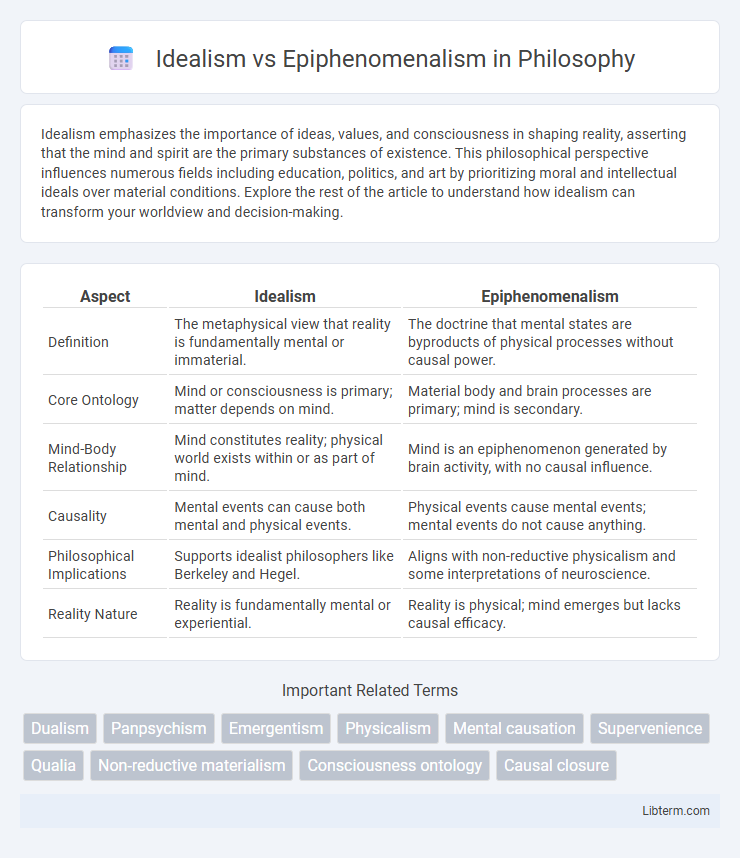Idealism emphasizes the importance of ideas, values, and consciousness in shaping reality, asserting that the mind and spirit are the primary substances of existence. This philosophical perspective influences numerous fields including education, politics, and art by prioritizing moral and intellectual ideals over material conditions. Explore the rest of the article to understand how idealism can transform your worldview and decision-making.
Table of Comparison
| Aspect | Idealism | Epiphenomenalism |
|---|---|---|
| Definition | The metaphysical view that reality is fundamentally mental or immaterial. | The doctrine that mental states are byproducts of physical processes without causal power. |
| Core Ontology | Mind or consciousness is primary; matter depends on mind. | Material body and brain processes are primary; mind is secondary. |
| Mind-Body Relationship | Mind constitutes reality; physical world exists within or as part of mind. | Mind is an epiphenomenon generated by brain activity, with no causal influence. |
| Causality | Mental events can cause both mental and physical events. | Physical events cause mental events; mental events do not cause anything. |
| Philosophical Implications | Supports idealist philosophers like Berkeley and Hegel. | Aligns with non-reductive physicalism and some interpretations of neuroscience. |
| Reality Nature | Reality is fundamentally mental or experiential. | Reality is physical; mind emerges but lacks causal efficacy. |
Introduction to Idealism and Epiphenomenalism
Idealism asserts that reality is fundamentally mental or immaterial, emphasizing the primacy of consciousness or ideas in shaping existence. Epiphenomenalism posits that mental states are byproducts of physical processes in the brain, lacking causal power over physical events. Both perspectives address the mind-body problem but diverge on the causal relationship between consciousness and the material world.
Defining Idealism: Mind as Primary Reality
Idealism asserts that mind or consciousness constitutes the fundamental reality, positing that all physical phenomena are manifestations of mental processes. This philosophical stance contrasts sharply with Epiphenomenalism, which treats mental states as secondary effects lacking causal power over physical states. By prioritizing the primacy of mind, Idealism challenges materialist interpretations that regard consciousness as a mere byproduct of brain activity.
Understanding Epiphenomenalism: Mind as a Byproduct
Epiphenomenalism posits that the mind is a byproduct of physical brain processes without causal influence on the body, contrasting sharply with idealism where consciousness is fundamental and primary. This theory suggests mental states arise from neural activity but cannot affect physical events, emphasizing a one-way flow from brain to mind. Neuroscientific studies on brain activity support epiphenomenalism by showing that unconscious neural mechanisms generate conscious experiences without reciprocal causal power.
Historical Origins and Key Proponents
Idealism traces back to ancient philosophers like Plato, who emphasized the primacy of ideas and mental constructs in shaping reality, with later developments by George Berkeley asserting that material objects exist only as perceptions. Epiphenomenalism emerged in the 19th century from the works of philosophers such as Thomas Huxley, positing that mental states are byproducts of physical brain processes without causal influence. Key proponents of idealism include Immanuel Kant, who synthesized empirical and rationalist traditions, while prominent epiphenomenalists include Frank Jackson, known for articulating the knowledge argument against physicalism.
Core Philosophical Differences
Idealism posits that reality is fundamentally mental or immaterial, asserting that consciousness shapes the nature of existence, whereas Epiphenomenalism treats mental states as by-products of physical processes without causal power over the physical world. Idealists argue that mind or spirit constitutes the primary substance, making physical phenomena dependent on mental activities. In contrast, Epiphenomenalists maintain a physicalist ontology where mental phenomena emerge from neural events but lack influence on brain function or behavior.
Implications for Consciousness and Reality
Idealism posits that consciousness is the fundamental substance of reality, implying that material objects depend on the mind for their existence, shaping a reality primarily constituted by mental phenomena. Epiphenomenalism asserts that consciousness arises as a byproduct of physical processes without influencing the material world, suggesting a unidirectional causality from matter to mind that limits consciousness to a passive role. These contrasting perspectives impact theories of mind-body interaction, with Idealism attributing primacy to consciousness in constructing reality, while Epiphenomenalism positions consciousness as an emergent, non-causal effect of physical brain activity.
Arguments Supporting Idealism
Idealism posits that reality is fundamentally mental, with consciousness shaping the nature of existence rather than material substance. Key arguments supporting Idealism include the difficulty of proving the independent existence of the physical world outside perception and the explanatory power of consciousness in accounting for subjective experiences. Philosophers such as Berkeley argue that all objects are collections of ideas perceived by minds, emphasizing the inseparability of existence and perception.
Critiques and Challenges to Epiphenomenalism
Critiques of epiphenomenalism primarily target its inability to account for the causal efficacy of mental states, challenging the view that consciousness is merely a byproduct of physical processes without influencing behavior. Philosophers argue that epiphenomenalism struggles to explain the apparent intentionality and functional role of thoughts, emotions, and desires in decision-making. Furthermore, neuroscientific evidence suggesting bidirectional interactions between brain activity and conscious experience poses significant challenges to the epiphenomenal framework.
Modern Perspectives and Debates
Modern perspectives on idealism emphasize the primacy of consciousness in constituting reality, often integrating insights from quantum mechanics and cognitive science to challenge materialist assumptions. Epiphenomenalism, which views mental states as mere byproducts of physical processes without causal efficacy, faces renewed debate over its explanatory power regarding consciousness and free will, especially in light of neuroscientific findings. Contemporary discussions frequently explore the implications of both views for the mind-body problem, highlighting ongoing tensions between ontological commitments and empirical evidence.
Conclusion: Evaluating the Impacts on Philosophy of Mind
Idealism posits that consciousness is fundamental, shaping reality and challenging materialist assumptions, while Epiphenomenalism views mental states as byproducts of physical processes without causal power. This contrast impacts the philosophy of mind by prompting debates on the nature of causality, the role of subjective experience, and the mind-body relationship. Evaluating these perspectives highlights the ongoing tension between prioritizing consciousness or physicality in understanding mental phenomena.
Idealism Infographic

 libterm.com
libterm.com